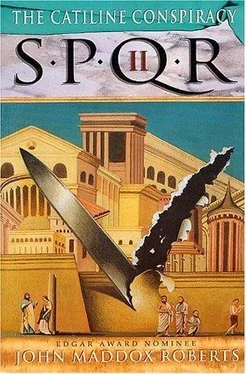John Roberts - The Catiline Conspiracy
Здесь есть возможность читать онлайн «John Roberts - The Catiline Conspiracy» весь текст электронной книги совершенно бесплатно (целиком полную версию без сокращений). В некоторых случаях можно слушать аудио, скачать через торрент в формате fb2 и присутствует краткое содержание. Жанр: Исторический детектив, на английском языке. Описание произведения, (предисловие) а так же отзывы посетителей доступны на портале библиотеки ЛибКат.
- Название:The Catiline Conspiracy
- Автор:
- Жанр:
- Год:неизвестен
- ISBN:нет данных
- Рейтинг книги:3 / 5. Голосов: 1
-
Избранное:Добавить в избранное
- Отзывы:
-
Ваша оценка:
- 60
- 1
- 2
- 3
- 4
- 5
The Catiline Conspiracy: краткое содержание, описание и аннотация
Предлагаем к чтению аннотацию, описание, краткое содержание или предисловие (зависит от того, что написал сам автор книги «The Catiline Conspiracy»). Если вы не нашли необходимую информацию о книге — напишите в комментариях, мы постараемся отыскать её.
The Catiline Conspiracy — читать онлайн бесплатно полную книгу (весь текст) целиком
Ниже представлен текст книги, разбитый по страницам. Система сохранения места последней прочитанной страницы, позволяет с удобством читать онлайн бесплатно книгу «The Catiline Conspiracy», без необходимости каждый раз заново искать на чём Вы остановились. Поставьте закладку, и сможете в любой момент перейти на страницу, на которой закончили чтение.
Интервал:
Закладка:
The office of the directors took up most of the second floor of the timber structure. It was spacious and rather luxuriously appointed, for a place of business. Entering this building was like stepping into another world. There were shrines to gods I had never seen before, and the walls bore enigmatic inscriptions and decorations, all having to do with the rites of the racing guild. Slave, freedmen and freemen, they all belonged to the guild and took part in its rituals. Within the guild, the various specialists had their own subguilds, shrines and even temples. That of the charioteers was especially fine and they got the most splendid, as well as the most frequent, funerals.
As I entered the office, slaves were setting up a crudely carved statue of a woman seated sideways on a horse, holding a key. The man supervising the work wore the clothes of an eques and noticed my interest.
"Epona," he said. "A Gallic horse-goddess. Some of our breeders in transalpine Gaul sent her as a gift."
"What is the key for?" I asked.
"It's a stable key, I think." He turned to me and introduced himself. "I am Helvidius Priscus, one of the directors of the Reds. How may I be of service to the Senate and People?"
I have often noticed this quality in Romans; an ability to recognize a public official. As a mere quaestor I had no lictors and no insignia of office and I dressed like a private citizen, but this man knew that I was some sort of official. I did not flatter myself that he remembered my face from the election. In that great mob it would take a twenty-foot statue of Jupiter to register a memorable impression. I was elected because I had announced my name in candidacy and the clients of the Metelli outnumber any other voting bloc. The lower offices are our birthright. The higher ones we have to fight for like everyone else.
"I am here to inquire into the murder of Decimus Flavius. I am Decius Metellus."
"The quaestor! Welcome, sir, you honor our establishment. I apologize for the clutter and rush, but we are getting ready for the next races, as well as picking the stallions to run in the festival of the October Horse. Please, come this way." I followed him into a broad room, one wall of which was mostly open to a balcony overlooking the circus gates. In the wide esplanade between, grooms from every nation walked their horses, talking to them in languages the beasts understood.
There was a broad table in the room, heaped with scrolls and sheets of papyrus. There were stacks of bronze plates upon which were inscribed the pedigrees of horses, some of them going back centuries. Around the table were seated several equites, a few freedmen secretaries, and a distinguished man who wore the strange, spindle-topped cap and other insignia of a flamen. This, as it turned out, was Lucius Cornelius Lentulus Niger, the Flamen Martialis. He was here in his capacity as high priest of Mars to oversee the choosing of the horses to run in the race of the October Horse. It was rare to encounter a flamen away from his home except when he was performing his sacerdotal functions because the flamines were so surrounded by ritual taboos that life was difficult for them. The highest priesthood of them all, Flamen Dialis, had been vacant for twenty-four years because nobody wanted it.
"Decimus Flavius was a most energetic director of the company," said one of the equites. "It came as a great shock to us all when he was so foully murdered."
"Under what circumstances was he found?" I asked.
"A cleaner found him over there in the circus," said Priscus. "He left here yesterday evening, just before dark. His home is just on the other side of the circus and he usually walked home that way."
"Would you be so good as to summon the cleaner?" I requested. A slave was dispatched to find the man. "Was the murder weapon left at the scene?"
"Yes, it's right here," said one of the directors. He reached into a box and rummaged among scraps of papyrus, ribbons and broken wax seals, and withdrew a knife, handing it to me. It was an unusual weapon, with a blade about eight inches long, straight for most of its length, then curving abruptly near the tip, doubling back to form a hook. It was keen on both edges. Someone had wiped the blade clean. There was no cross guard and the grip was of plain horn.
"This is a charioteer's knife, is it not?" I asked. Since a charioteer's reins are knotted around his waist, he has only a few seconds to cut himself loose after being thrown. Thus he may avoid being dragged to death or dashed against the arena wall or against the spina. If he succeeds in this, he need only fear being trampled by the other horses.
"It is," Priscus affirmed.
"Might he have been killed by a charioteer, then?" I asked.
"Charioteers only carry these knives when they are racing," said a director. "A dresser tucks one in the driver's body bindings just before he gets into his chariot."
"There are hundreds of them in our supply rooms," Priscus said. "But there must be thousands out in the city. The race enthusiasts beg them from victorious drivers and carry them for luck. They bribe track attendants to get them knives that charioteers have successfully freed themselves with. You know how superstitious those people are." This seemed to be another dead end as far as the murder weapon was concerned.
"Do any of you know if Flavius was in the business of lending money at interest?"
"I know that he was not," Priscus said. "At least, not in recent years. He made his fortune breeding horses, and here at the circus. He lost heavily after Lucullus's cutting the debt of the Asian cities, and swore he'd never lend money again." Thus was my theory that moneylenders were being systematically eradicated further undercut.
The cleaner arrived and, thanking the directors, I excused myself. I kept the knife and tucked it into my tunic belt. I was acquiring quite a collection of these sinister souvenirs. Its shape was highly specialized, which made it seem an odd choice for a murder weapon. A straight dagger or a sica made far more sense. Perhaps this murder had been unplanned.
"It was over here, master." The slave was a middle-aged man with a Bruttian accent. The Bruttians are worthless people, as all Romans know. Bruttium surrendered to Hannibal without a fight. They make adequate slaves, though. "I was taking some trash to this heap that's going to be hauled away sometime around Saturnalia."
We were walking beneath the wooden arcades of the circus. The great structure above us creaked and groaned as the morning sun warmed it. Despite that, the gloom belowstairs was deep. Some light came in through the arches, but the nearby buildings allowed little light to reach them. We turned from the main arcade into a short tunnel that ended at a great heap of trash of the sort that only a circus accumulates: broken spokes and other wreckage of the flimsy racing chariots, wax tablets recording bets flung down and smashed by enraged losers, polishing rags discarded by handlers, straw packing left by vendors and a multitude of other trash, probably a year's worth of it.
"He was right here," the slave said, pointing to a large, dark stain at the foot of the trash heap. It seemed an odd place for a prosperous eques to die. The others seemed to have been murdered in places that made some sense. Might he have been killed outside, in the arcade, and dragged in here? But there was no trail of blood, as there surely would have been in such a case. He must have been killed right on that spot. Perhaps he had been waylaid outside and forced into this tunnel.
"Who works in this area at night?" I asked the slave.
"Nobody. When it's not a race day, the circus is empty by late afternoon. We slaves must be in our barracks by dusk and there is no cause for freemen to be here. Maybe a few whores are here after dark."
Читать дальшеИнтервал:
Закладка:
Похожие книги на «The Catiline Conspiracy»
Представляем Вашему вниманию похожие книги на «The Catiline Conspiracy» списком для выбора. Мы отобрали схожую по названию и смыслу литературу в надежде предоставить читателям больше вариантов отыскать новые, интересные, ещё непрочитанные произведения.
Обсуждение, отзывы о книге «The Catiline Conspiracy» и просто собственные мнения читателей. Оставьте ваши комментарии, напишите, что Вы думаете о произведении, его смысле или главных героях. Укажите что конкретно понравилось, а что нет, и почему Вы так считаете.










